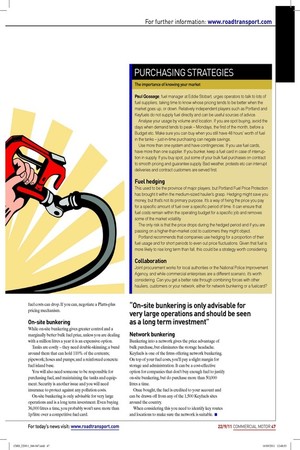PURCHASING STRATEGIES
Page 31

If you've noticed an error in this article please click here to report it so we can fix it.
The importance of knowing your market
Paul Gossage, fuel manager at Eddie Stobart, urges operators to talk to lots of fuel suppliers, taking time to know whose pricing tends to be better when the market goes up, or down. Relatively independent players such as Portland and Keyfuels do not supply fuel directly and can be useful sources of advice.
Analyse your usage by volume and location. If you are spot buying, avoid the days when demand tends to peak – Mondays, the first of the month, before a Budget etc. Make sure you can buy when you still have 48 hours’ worth of fuel in the tanks – just-in-time purchasing can negate savings.
Use more than one system and have contingencies. If you use fuel cards, have more than one supplier. If you bunker, keep a fuel card in case of interruption in supply. If you buy spot, put some of your bulk fuel purchases on contract to smooth pricing and guarantee supply. Bad weather, protests etc can interrupt deliveries and contract customers are served first.
Fuel hedging
This used to be the province of major players, but Portland Fuel Price Protection has brought it within the medium-sized haulier’s grasp. Hedging might save you money, but that’s not its primary purpose. It’s a way of fixing the price you pay for a specific amount of fuel over a specific period of time. It can ensure that fuel costs remain within the operating budget for a specific job and removes some of the market volatility.
The only risk is that the price drops during the hedged period and if you are passing on a higher-than-market cost to customers they might object.
Portland recommends that companies use hedging for a proportion of their fuel usage and for short periods to even out price fluctuations. Given that fuel is more likely to rise long term than fall, this could be a strategy worth considering.
Collaboration
Joint procurement works for local authorities or the National Police Improvement Agency, and while commercial enterprises are a different scenario, it’s worth considering. Can you get a better rate through combining forces with other hauliers, customers or your network, either for network bunkering or a fuelcard?




































